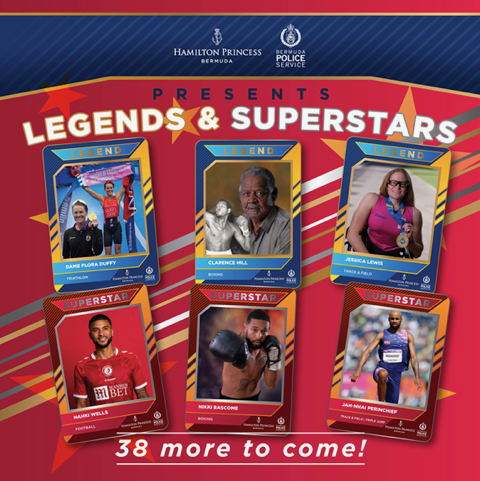Commissioner George Robins third year - 1963

Introduction to 1963
This is the third in a series of articles by retired Detective Superintendent George Rose about the years during which the Bermuda Police was headed by Commissioner George Robins. This article relates to 1963, and much of the information has been gathered from the daily and weekend newspapers along with our Police Magazines. Many of the photos below have been scanned and copied from the newspapers and due to the technology of that era they are not of the best quality.
Early in 1963 Commissioner Robins expressed concern about problems with juvenile crime and wondered if having a YMCA could be a helpful solution. A small science laboratory was established at Police Headquarters which was already reducing the costs of needing to send evidential material overseas for testing, and during a visit to Bermuda, the British Home Secretary paid a visit to police headquarters and said he was impressed by what he saw there.
In March the Bermuda Police Association raised “important grievances’ that existed in the Police Force including salaries, housing allowances, conditions of service and leave arrangements, which were brought before Commissioner Robins. A subsequent Civil Service Report made recommendations on these matters to the Legislature. Later in the year a new salary scale for police was presented to the House, and a revised Police Act was placed before the Executive Council for consideration with provisions that were said to be likely to provide the Force with much needed stability for years to come.
In June of his third year as Commissioner, Mr. Robins released the annual Police Report for 1962 in which he noted favorable reaction to the introduction of policewomen, along with the effectiveness of Beach patrols, the Dog Section, Cycle Squad, and the separation of the Police as a body from the Civil Service.
In July the Commissioner commented on the increased size of the Police Force noting that in 1957 the establishment of the Bermuda Police was 163. During the year of the Warwick Murders (1959) it stood at 211, and in 1960 it increased to 274. Mr. Robins observed that Bermuda had a bigger police force than other countries of a similar size, but pointed out that one of its most important functions was “to ensure that tourists enjoy Bermuda with a minimum of interference or molestation of any sort.” He also commented on the increasing prevalence of unlicensed firearms, and identified marijuana as becoming a growing menace in Bermuda.
August saw the re-introduction of Bermuda’s traditional Parish Constables. Mr. Robins noted that the appointment of parish constables was as old as Bermuda’s parliament, dating back to 1620, and way back then parish constables swore an oath of office just as constables were doing in 1963.
Hurricane Arlene directly struck Bermuda in August keeping the Island Police busy and causing thousands of pounds worth of damage, but no casualties. One positive effect of preparing for Hurricane Arlene was that advanced preparations for it led to the formation of what later became known as the Emergency Measures Organization.
In October Commissioner Robins travelled to Houston, Texas, to attend the 70th Annual Conference of Chiefs of Police. This was the first time any Bermuda Chief of Police had attended the conference.
Also in October Bermuda was visited by His Imperial Majesty, Emperor Haile Selassie who's plane stopped briefly at the civil air terminal for re-fueling. The airport was packed with people who came to witness this historic event.
November saw two serious sexual assaults (rapes) committed in Warwick Parish, which again raised the issue of whether there should be a permanent police-sub-station in Warwick Parish to serve the Western Parishes. This proposal was first raised during the Warwick Murders in 1959, although the proposal was never adopted. Commissioner Robins wanted to thank the residents of Warwick and the Salvation Army Church in Warwick for allowing their church to be used to house a temporary police station during the rape enquiries, and he presented a new table tennis table to the Salvation Army as a token of the appreciation of the Police.
Also in November the Police launched a short police recruiting film in an effort to attract more Bermudians to consider a career in the Police.
The Police Training School was getting into full swing in 1963, with Basic Training Course No. 3 having been held from April to June for local recruits, and in December Basic Training Course No. 4 was completed for 12 expatriate officers from the U.K.
During 1963 Commissioner Robins continued to encourage members of the Police Force to get involved in local sports, such as cricket and football, rugby, field hockey, squash, billiards and snooker, and one sport that was rapidly increasing in popularity was sailing. A group of young police officers had earlier formed the Bermuda Police Boat Club and at its annual prizegiving in December, Mr. Ronnie Marshall from Spanish Point Boat Club commended the Police for doing an admirable job under great difficulties, and observed that their participation in sports led to a better understanding between the Police and the public. The Police also had a team participating in the Somers Isle Rifle Club with the police team winning the 1963 annual J.E. Lightbourne Cup. Our two 1963 Police Magazines, published in Spring and in Winter provide more details of police related sports activities.
Police Commissioner G. H. Robins, acting in his capacity as Provost Marshall for civil debts, has issued a writ of seizure against the American-owned 65-foot schooner Curlew, it was learned on Saturday. The acting Attorney General, the Hon. Hector Barcilon, and the principal officer of the Marine Board, Mr. Stanley Gascoigne, told a Royal Gazette Weekly reporter that the writ was issued because no bond had been posted with the salvagers.
P.c. Tony Harper, of the Provost Marshall’s office, did the actual serving of the writ, which instead of being nailed to the mast as is customary, was tacked to the bulkhead because the mast had just been painted. The writ was served at noon on Friday, the police said.
“There is a considerable juvenile problem here,’’ declared Det. Supt. Richard Fielders, chief of the Criminal Investigation Department, at last night’s annual general meeting of the Devonshire branch of the Bermuda Welfare Society. Quoting police figures for 1961, – since last year’s figures are not yet ready for publication, he said that 680 people were arrested. Of this number 467 were less than 22 years of age; 141 being under 16 and the remaining 326 between the ages of 16 and 21.
Second, the head of the C.I.D. asked that anyone hearing or seeing anything suspicious to call 2-2222 and inform the police. He stressed the importance of not frightening a would-be burglar — although this might at times be difficult — and just telephoning as quietly and calmly as possible so that the police could come and surprise the intruder immediately.
Mentioning some of the jobs facing the C.I.D., he explained that this department of the police force investigated suspicious and unusual deaths and suspicious fires. He recalled last year’s fire at the Colonial building and the long inquest which resulted in 19 hours of evidence.
He stressed the importance of C.I.D. men having the ability to catch thieves and knowing the law. This sharpened their wits “and if you don't know the law very well you are pretty good meat for members of the bar" he pointed out.
Through tuition, instruction and attending crimes, a good C.I.D. man learned to know that in any crime of consequence which occurred at night, it was imperative to search the premises again in daylight, since vital pieces of evidence might have been overlooked by night, no matter how good the lighting was.
He knew that in the past specimens had been flown out of Bermuda to Scotland Yard or the Royal Canadian Mounted Police laboratory in Ottawa for identification. He agreed that this was expensive, adding that now the C.I.D. had its own “little laboratory” at Prospect and the chances of having to send things overseas were getting less.
“As a result of getting some equipment ourselves and also using the facilities that are available in the several laboratories here, we can now do quite a lot of this work,” he announced. “It is making Bermuda stand on her own feet and making the police force very much more efficient. What are we trying to achieve?” he asked. "We are trying to produce and train a police force Bermuda will be proud of, one which will give you a really good service; and we can only do that by training and getting available equipment. We must keep up with modern science and equipment.”
He felt it was the duty of all “right-thinking citizens to support the police department in Bermuda,” and mentioned that he had noticed in Swansea, Wales, the police being very helpful to young people.
Mr. Fielders agreed that juvenile liaison police officers in the United Kingdom did a lot of good in youth clubs, etc., and, while he had not been in Bermuda long enough to know how such a system would work, he saw no reason why this might not be a good thing in Bermuda.

More than 100 policemen lined the path from Christ Church, Warwick, to the cemetery, while pallbearers carried the coffin of their young and popular colleague, 22-year-old P.c. Andrew Wilson, who died in hospital early on Thursday morning. The funeral service conducted by the Rev. George Buchanan, was attended by about 150 policemen, 100 of whom were in uniform, and eight members of the Bermuda Pipe Band. P.c. Wilson’s parents, Inspector John Russell Wilson and Mrs. Wilson, also attended the service.
The Police Commissioner, Mr. G. Robins, the deputy Commissioner Mr. Frank Williams, Chief Superintendent H. M. Saunders, and the C.I.D. chief superintendent R. Fielders, attended the service. Pipe major P.c. R. Leach piped the pallbearers to the graveside where he piped “'Flowers of The Forest.” P.c. A. Johnson was the organist.
The pallbearers were Constables A. Dryburgh, T. Burch, L. Hall, J. Swift, T. Hill and C. Rae.
P.c. Wilson remained unconscious in the King Edward Memorial Hospital for 12 days and “took a turn for the worse” on Wednesday. P.c. Wilson, whose home was in Glasgow, Scotland, had been in the Bermuda Police Force since March 20, 1962, and was a patrol officer in the Central Division. His father, who is an inspector in the Glasgow Police Force, said last night. “My wife and myself would like to thank, through the offices of Royal Gazette, the Rev. George Buchanan of Christ Church, Warwick, for the warm spiritual comfort he has given to us day by day during our stay, and for his beautiful service at the funeral of our son, Andrew, today.”
The Rt. Hon. Henry Brooke, British Home Secretary and leader of the British delegation to the Bermuda Parliamentary conference, toured police headquarters at Prospect on Saturday morning. He was said to have been impressed with the work there and when leaving commented: “You are extremely fortunate not to have organized crime in Bermuda.”
When he arrived, Mr. Brooke met the Commissioner of Police, Mr. G. H. Robins, and inspected the criminal records office and the traffic department. At the laboratory he was met by Superintendent R. Fielders, C.I.D. chief, and was shown some of the Colony’s methods of crime detection.
Mr. Brooke was then conducted around the single men’s quarters and saw the operations office where Inspector J. S. (Jack) Wilson and Chief Superintendent Frank Williams explained the procedure to him. Mr. Brooke arrived at Prospect a little before 10.30 and was there for about one hour.

The Commissioner of Police, Mr. G. H. Robins, is to be approached by the Bermuda Police Association over the Civil Service Report presented to Legislature last week, it was learned yesterday.
Meetings were held at St. George’s and Prospect on Monday and at Sandys yesterday at which conditions and wages in the force were debated and resolutions passed.
Mr. Robins is to be asked that the minutes of the meetings and the substance of the grievances discussed be circulated to all 36 M.C.P.’s before they consider the joint Finance and Civil Service Committees’ recommendations on the Civil Service report. Every important grievance that exists in the police force was discussed at the meetings, including salaries, the housing allowances and leave arrangements.

Control of the City of Hamilton will change hands in a bloodless coup on Thursday morning when 20 members of the Bermuda Reserve Constabulary will take over from the regular Police.
The first exercise of its kind, it will see the Reserves running the entire police operations in the City, from traffic control to the manning of police stations. Starting at 8.0 a.m., it will continue until 1 a.m., thus taking in two rush-hour periods.
And it’s no game. The Reserves will be practicing for the role they would have to play if a national emergency occurred in Bermuda and took the regulars out of the City. Wearing their blue caps and air-force blue uniforms, they will direct traffic at Hyle’s Corner and Spurling’s Hill, mount guard at Government House, walk the beat on the lookout for delinquent parkers and man Hamilton Police Station. They will have full powers of arrest and will carry the customary whistle, notebook, truncheon and chain grips. The dock surveillance and police motor patrols will not be affected by the exercise, nor will police operations outside the City.
Giving details of the plans at a press conference yesterday, Mr. William McPhee, commandant of the Reserve Constabulary, and the Police Commissioner, Mr. G. H. Robins, paid tribute to the employers who had co-operated in giving the 20 Reservists time off. Mr. McPhee added that the reserve force would consist of 16 constables, two sergeants and two inspectors, who would come under the control of Assistant Commandant Mr. Ralph Ferguson.
“I can set any motorist’s mind at rest who fears we are going to be meddlesome,” Mr. McPhee went on, "but on the other hand neither are we going turn a blind eye.”
The practice is the second stage in the training program the Reserves have embarked upon since they were reorganized in October. A five-month series of night training sessions with the regular police ended earlier in the month, and had proved a great success. "But conditions at night are very different than they are in the day, both on the streets and in the station,” observed the Commissioner.
The Constabulary now has 60 members, all volunteers, and the accent has been placed on youth since the reorganization in October. Young men over 26 are invited to join, and an amendment to the regulations is planned which will enable women to be recruited for the first time.
The President of Mexico, Adolfo Lopez Mateos, arrived in the Colony yesterday afternoon for an overnight stay before continuing on his journey to Europe, where he will be making a state tour. President Lopez was met as he left his plane by the Governor, Major-General Sir Julian Gascoigne. They shook hands and exchanged a few brief words of greeting before being driven to the Castle Harbour Hotel, where the President and his party of 65 are staying. The President and his party were due to leave Bermuda at 6 o'clock this morning for Bordeaux. From there they will fly to Paris where President Lopez will meet President de Gaulle.
Their plane, an Aeronaves de Mexico D.C. 8, arrived only about twelve minutes after the scheduled time of 5.30 p.m. and was reported to have left Mexico City on schedule. The many tourists in transit at the Civil Air Terminal were unaware that the important visitor was due to arrive, although later the whisper started to go around.
The Commissioner of Police, Mr. G. Robins, and other uniformed officers waited in the chilly wind which was sweeping across the airfield while plain clothesmen mingled with the crowds of travelers.
The Somers Isles Rifle Club held their fourth annual dinner on Saturday night. It took place at the Islander Club, which was “closed range” to the S.I.R.C. for the evening. Presiding over the head table was E. Ross Cooper, president of the club, assisted by L. Fearis, vice-president.
The Presentation of the prizes was made by the Commissioner of Police, G.H. Robins.
In a short speech, Mr. Cooper introduced Mr. and Mrs. Robins to the club, along with others at the head table – Mr. and Mrs. Donald Drury. Mr. Drury being the president of the Bermuda Rifle Club, Mr. McGreggor, Superintendent of Police; Captain and Mrs. Forbes. Mr. Cooper thanked the ladies of the committee who had decorated the tables – Mrs. Warwick, Mrs. France and Mrs. Ripley.
In the prizes presented, Harold Molyneaux won the Arthur France Trophy as Class Champion, Jim Wardrop the runner-up; Nick Hall the “B” Honours and Jim Fairhurst was the runner-up.

GOVERNOR INSPECTS POLICE HEADQUARTERS ON APRIL 5
THE BERMUDA POLICE MAGAZINE – SPRING, 1963 page 31

Seated in the long living-room, the guests rose as the Governor, in uniform, entered with Lady Gascoigne and Captain Davio Gascoigne, his A.D.C. First to be honoured was Sir Harry Durham Butterfield. C.B.E., who was knighted by the Queen. He walked the length of the room to receive the heavy gold medal of a Knight Bachelor, and returned amid applause.
The Colonial Secretary, Hon. J. W. Sykes. C.V.O., was the next to receive the ribbon medal of his Companion of Most Distinguished Order of Saint Michael and Saint George.
Three Civil Division awards were made — to Mr. Gordon R. Groves, to Mr. Arthur G. E. Adams, to Miss Elizabeth Appleby. Mr. Groves was awarded the O.B.E. and Mr. Adams and Miss Appleby the M.B.E.
Two Colonial Police Medals were awarded — to Chief Inspecter Joseph Nixon and Detective Inspector Denbrook.
Following the presentations Sir Julian and all the guests filed forward to congratulate the award recipients, after which champagne was served to all who were present. The party of official guests included: Archdeacon the Ven. Jack Cattell; the Chief Justice and Mrs. Abbott; Sir John and Lady Cox; Mrs. John Martin; the Hon. the Attorney General; Hon W. W. Davidson; the Hon. J. E. Pearman and Mrs. Pearman; the Hon. A. D. Spurting and Mrs. Spurling; the Hon. J. E. P. Vesey; the Hon. W. L. Tucker and Mrs. Tucker; Lt.-Col the Hon. J. C. Astwood; Sir Allan and Lady Smith; the Resident Naval Officer and Mrs. Rutherford; the Hon. B. T. Gosling and Mrs. Gosling; the Hon. B C. C. Outerbridge and Mrs. Outerbridge; the Hon. Edmund Gibbons and Mrs. Gibbons; the Hon. F. C. Misick and Mrs. Misick; the Hon. V. O'D. King and Mrs. King; the Commissioner of Police and Mrs. Robins; Mr. Colin Selley.
Unable to attend were: Mrs. J. Cattell, Mrs. J. C. Summerfield, Mrs. J. E. P. Vesey, Dr. the Hon. E. A. Cann and Mrs. Cann, Mrs. J. C. Astwood and Lt.-Col. J. B. Tucker and Mrs. Tucker.
Invited guests included: Lady Butterfield; Messrs. N., R., and C. Butterfield; Mrs. J. W. Sykes, Miss Melisande Sykes, Mr. Paul Sykes; Mrs. G. R. Groves; Mr. and Mrs. Idwal Hughes; Mrs. A. G. E. Adams; Mrs. Madeiros, M.B.E.; Miss Mary Williams; Mrs. Jack Pitt; Miss Mary Gray; Mrs. J. Nixon, Miss Wendy Nixon and Mr. Denbrook.
Unable to attend were: Miss A. E. Gosling, Mrs. Emily Motyer, Mrs. Denbrook and Mr. Charles G. Allen.

The funeral of a policeman who died in hospital early yesterday morning was held at St. James’s Church, Somerset, yesterday afternoon.
The officer, 28-year-old Police constable Michael Frederick Henry Hills, who had been in the Bermuda police force since 1957, had been ill for some time and was admitted to the King Edward VII Memorial Hospital three weeks ago. He died of Hodgkins disease, which is a form of cancer of the blood, a hospital spokesman said.
P.c. Hills, who came from Hemel Hempstead, Hertfordshire, England, is survived by his wife, Ann, and a two-year-old son, Andrew, who are both living in the Colony. He also has a brother and sister living in Bermuda. He was stationed at Somerset in the Western Division. He had been to the United Kingdom for treatment and then came back to the Colony and recommenced his duty last year.
His funeral was attended by senior officers of the police force, including the Commissioner of Police, Mr. G. Robins, and Chief Superintendent H. Saunders. There were also a large number of police officers present to mourn their colleague.
One of the youngest, active grandmothers one could meet is vivacious Lou Robins, whose husband is the Commissioner of Police.
I can’t imagine how she finds time to accomplish so much. During the week she has been busy as chairman of the ladies guild of the Bermuda Sailors Home, which has been entertaining sailors off the Spanish training ship, Juan Sebastian do Ellcano.
An excellent artist, she is always busy painting in her studio at home, and she teaches art at Kindley U.S. Air Force Base once a week. She does many more things for the community generally (I’m afraid I can’t remember all of them!) including helping with activities for St. Mark’s Church.
Mrs. Robins is also keen on gardening and grows sufficient vegetables for several families! She is finding them useful now, since her house is full. She and her husband have their eldest daughter, Pamela, plus her husband and two children since early last month. Captain David Simpson, who is in the army, has been stationed in Nigeria and, when the family goes to England at the beginning of June, he will be posted to Aldershot. And that is where the Robins’s third grandchild will be born.
Their other two children are both in England. Jenny is in the real estate business in London, while Peter (the youngest of the three at 22 years), is articled to a chartered accountant. He will take his finals next year.
The scheme was started in March last year and Chief Inspector R. P. Chandler, in charge of the police training, told the RG it is hoped every officer in the force will have first-aid training. The first award winners were presented with their certificates in December by the Governor.
The Commissioner of Police Mr. G. H. Robins, presented the life-saving awards and Mr. John Fountain, commandant of the St. John Ambulance Brigade, presented the first-aid awards.
Intermediate certificates to P.c.’s D. J. Adam, J. Cooney, A. J. Langford, and C. Simons, and Cadet H. F. Edwards.
Of the St. John Ambulance awards, the bar to the bronze medallion was awarded to D.C. T. A. Oliver, and first-aid certificates went to Police Sergeants J. M. Cafferty, R. Coppock, R. A. J. Lister, T. Nichols and D. Parsons.
First-aid certificates also went to:
P.c.’s J. R. Allan, J. F. Bailey, D. G. Barnett, T. J. Bowden, F. N. Beard, W. A. Black, M. H. Bull, T. Cassin, C. J. Chiswell, G. I. V. Davies, H. C. T. Dill, H. E. Edwards, L. M. Edwards, H. J. Fothergill, G. D. Garland, G. J. Garrod, M. W. Gibbons, A. D. M. Gordon, N. J. Hall, L. E. Hall, G. W. Hammond, A. M. Harper, A. E. Heggie, R. Henagulph, G. E. James, M. W. F. Johnson, I. D. Johnson, C. E. Towett, R. Livesey, M. J. Lohan, K. T. Lovell, J. K. Lyons, W. C. McBurnie, P. V. O’Neill, R. E. C. O’Shea, K. Pratt, W. F. Pratt, C. Y. Rae, D. F. Proctor, J. S. Ripley, G. T. Rowse, B. M. Rutkin, J. Sanders, J. Swift, J. Travis, R. C. Vincent, W.p.c. M. Wainwright, M. W. N. White, M. C. Williams, M. S. Woods and A. Wyatt.

Throughout the Commonwealth on Saturday celebrations to mark the Queen’s birthday were staged. And, at Prospect Field, Bermuda made her own colourful contribution to the celebrations.
About 500 servicemen and policemen took part in a parade which was attended by the Governor, Major-General Sir Julian Gascoigne, representing Her Majesty, local dignitaries, officers from the U.S. Bases, and hundreds of spectators. Adding to the pomp of the ceremony was the 21-gun salute which resulted in clouds of smoke rolling across the field, enhancing the impressiveness of the occasion. Cameras worked overtime from the outset of the parade as the various detachments arrived to set the scene in readiness for the Governor’s arrival.
Included in the parade were men from the Bermuda Rifles, the Bermuda Police Force, resplendent in white jackets and spiked helmets, men of the Reserve Constabulary in white helmets, the Fire Brigade in their blue uniforms and peaked caps, the Bermuda Cadet Corps, the Bermuda Militia, Marines and men of H.M.S. Whirlwind and the massed bands of the Bermuda Rifles, the Militia and the Pipe and Drum Band of “A” Company, Bermuda Cadet Corps. Parade keepers were represented by Girl Guides, Boy Scouts, the Cadet Corps and the St. John Ambulance Parade.
The parade commander was Cdr. J. S. Lessey of H.M.S. Whirlwind.
Soon the parade was set for the arrival of the Governor. First to arrive was Lady Gascoigne, who came in a horse-drawn buggy escorted by police officers. Minutes afterwards the Governor, in full dress uniform, arrived. He inspected the parade and then, with Colonel J. B. Tucker, commander of the Local Forces, the Commissioner of Police, Mr. G. Robins, and Cdr. Nicholas Rutherford, resident Royal Naval officer, he took up his position in the centre of the parade ground facing the dais while the Royal Standard was broken.
This was followed by the 21-gun salute, and then the Standard was lowered representing the departure of Her Majesty from the field. The Governor then led three cheers for Her Majesty, and, with other military dignitaries, took up his position on the dais for the march past.
The parade came to a conclusion with the Royal Salute after which the Governor’s limousine with its police escort drove up to take him away. This was followed by Lady Gascoigne’s carriage.

 The Governor inspects men of the Bermuda Police Force who were among the 500 uniformed
The Governor inspects men of the Bermuda Police Force who were among the 500 uniformed
The Bermuda Police Force had to deal with 3,175 crimes and 2,128 traffic accidents during 1962, according to the annual report of the department presented to both branches of the Legislature. The number of crimes showed an increase of 471 over 1961, when 2,704 crimes were committed, but the institution of a more accurate and detailed method of recording at the year tends to make this a paper increase, the report says.
Excluding the removal of cycles – 1,113 cases in 1962 against 1175 in 1961 – the percentage of crime cleared up was 37 per cent; 661 arrests were made including 44 persons under 22 years of age.
On the traffic scene charges resulting out of 2,128 accidents totaled 469. The figures for injured were 1,002 (1,008 in 1961) and 175 tourists were involved, compared with 144. There were 14 fatalities.
Traffic offenders taken to court and convicted totaled 5,360 and 1,444 of these were speeders. Ten per cent of the 18,000 vehicles registered were involved in accidents, with auxiliary cycles being involved in half of the accidents, closely followed by private cars (48 per cent).
The amount of juvenile delinquency is even more revealing when the arrests for breaking and entering are considered. Out of the 88 persons arrested for breaking and entering during 1962, no fewer than 62 were under 16 years of age. In other words, 70 per cent of persons arrested for breaking and entering were under 16 years of age.
During 1962 breaking and entering offences rose to 300 (235). Numbers in brackets represent the figures for 1961.
The larceny of vehicle parts, namely the stripping of parts and accessories from motor cars and cycles, increased to 105 (63). There was a welcome drop in the number of removed motor cars, which amounted to 51 (92).
Prowling almost doubled from 131 in 1961 to 240 in 1962, but this is largely due to the more accurate recording of such offences and may be regarded as a paper increase.
“Two-thirds of the crime committed in Bermuda is on the Central Division, which comprises of the City of Hamilton and the Parishes of Pembroke, Paget and Devonshire. This area houses just over half the Bermuda population (i.e. excluding Armed Forces and visitors).
"Two thousand and sixteen criminal offences were recorded on the Central Division out of an Island total of 3,175. One hundred and eighty nine out of 300 cases of breaking and entering were recorded on the Central Division and 823 out of 1,113 of removing cycles.
The report continues:
“For overseas recruits, G.C.E. O Level in at least three subjects is required; this hurdle is lowered very greatly for Bermudians. The standards of efficiency and service to the public must be maintained. The result of the recruiting difficulty is twofold.
“First, recruiting in the United Kingdom has to continue for the present: secondly, local recruits find difficulty in competing with overseas recruits in the Promotion Examination. However, several have been successful after Pre-Promotion Courses.
“Of necessity, there has been too large a proportion of Police recruited overseas and their morale has suffered. The net result has been a severe loss of United Kingdom recruited Sergeants and Constables. The loss of dissatisfied men makes recruiting new Constables of high quality much more difficult. It will be some years before this major problem of recruiting can be solved. It depends largely on education and is not only a matter of pay; but of service conditions and of service prestige.
“The Police Association submitted many recommendations during the year, but little if any progress was made. This greatly discouraged the Association and caused its members to lose confidence both in the Association and in Government. I have hopes, however, that consulting, if not negotiating, machinery will be set up and that it will become a feature of a greatly improved Police / Government relationship.”
“Three armed robberies occurred in Bermuda in 1962. In each case, the men wore a mask and some of them carried firearms. The night cashier at the Princess Hotel was robbed; an unsuccessful attempt was made upon a girl cashier at the Briton Hotel, and finally the manager of the Blue Hole Gas Station was held up. Two men have now been arrested for this last offence. One man received a sentence of seven years imprisonment, while the other was found not guilty.
The year under review saw the advent of the “School crossing patrol” at pedestrian crossings at or near schools. An amendment to the law has now given the wardens at these crossings the necessary protection and authority.
The Squad will be re-formed for similar duties in 1963. Dog Section, although dealing mainly with “prowling" cases, was also called upon to assist in various other cases. Of the 240 true cases of prowling, the Section attended to 111 and were responsible for eight of the 25 arrests that were made for this type of offence. The preventive effect of having the Dog Section for this particular type of offence, although hard to assess, nevertheless must be quite considerable. The Section were also responsible for 23 arrests for such offences as breaking and entering, assault and escaping from lawful custody.
“The five members of the Photograph and Fingerprint Section attended a total of 469 scenes of crime, traffic accidents, sudden deaths and fires, – 393 in 1961. Three hundred and twelve of these cases required fingerprint examination. “There are now over 2,000 fingerprints on file.”
“An important part of the work done by Policewomen is in dealing with women and children, and many more sexual offences involving girls under the age of 16 years have come to light. In the past, very little action was taken in respect to these offences, mainly because a young girl is naturally reluctant to disclose intimate details to a male Police officer. On the other hand, such information is revealed to a Policewoman.
“These offences give cause for concern, often the girl involved is ‘very conversant with the facts of life,’ and is a willing partner to casual sexual intercourse. In some cases where the girl has had a “steady” boyfriend, sexual intercourse has been an accepted part of the relationship.
“Many of the girls concerned lack guidance in their home life. Quite a few are themselves illegitimate and have been in the care of anyone willing to given them shelter. Due to the lack of facilities, it has not been possible to bring these girls before the Court as ‘ill-treated or neglected’ children.
The Police Commissioner was asked about this [and was told that] a member of the force had expressed what might be a general feeling: “When you join the police in Britain you know exactly what you are going into; what your pay is; what your leave is; what your duty is; what your pension is going to be if you fulfil your service . . . This is not the case in Bermuda,” Mr. Robins conceded that the generalization, as a generalization, could apply.
He called in Detective Chief Inspector O. S. W. Trott, chairman of the executive committee of the association, and put to him the questions that had been asked. Inspector Trott recalled he had been annually re-elected as chairman of the executive committee of the association since it had been formed. The association represented (by delegates) every rank up to and including his own.
Mr. Robins explained the association is not a trade union. It is not analogous to the teachers’ union or the labour unions. “A policeman cannot strike … he is deprived of this privilege by his oath.” According to a constable’s oath he promises in so many words always to carry out his duty to the best of his ability.
He turned to the place of the police in Bermuda. “We are not a Colonial Police Force,” he declared. He was told it was freely canvassed in some quarters that the police are “merely the garrison in a different uniform.”
He said it was important people should know this; the analogy between Bermuda’s Police Force and any other would correctly be with that of England, not with that of any other colony, and thus, if the analogy were carried through, it would be his submission the same relationship might exist between Bermuda’s police and the Government . . .. in other words, through itself as incorporated in a Police Association.
A “Police Act” was now before the “Executive Council,” Mr. Robins disclosed. This, if acceptable and accepted would the bible of the Bermuda Police in the same way that the T.D.B. Act is the bible of the T.D.B. [Trade Development Board], or the Health Act the bible of the Department of Health. Moreover, it would include all the answers to all the questions a potential policeman might ask before joining up. Uniforms, leave, duties, allowances, regulations – the lot.”
Speaking of the pending resignations he said, “This might change their minds. Indeed, one of the men concerned had remarked to him, in his capacity as association head: “This is a lot different . . . “
Chief Inspector Trott remarked that among those proposing to leave the Force, as at present constituted, were seven local men. There are now 66 local men on the force whose strength is 243. With seven resignations there will be 55 local men, and only four, including one woman, being trained.
“That appeals to local men,” he said.
Mr. Robins said one factor that played a part in police administration thinking regarding the continual attrition of men from the force was that so many of these who left were experienced men. All in all, it costs no less than £50 merely to recruit a man, never mind paying his fare to Bermuda, and then training him for local duty, it was learned.
“Thirty per cent of the 1961 intake have resigned,” Mr. Robins said.
It was quite clear to him that the new deal, of which the proposed new pay package is a part would have an instant and remedial effect upon the situation. It was his thought that if the police act which was now before the Government was found acceptable, stability would be achieved. Chief Inspector Trott endorses this view.
The Commissioner of Police was in Cyprus in 1954. Asked if he was there during the troubles Mr. G. H. Robins smiles. He hadn’t been in that troubled colony as Commissioner of Police for a month before the enosis faction [an ideology] started “throwing stones and so on and so forth.”
“They were after traitors. One of their purposes was to nullify police work. They got one of my best men when he was visiting his wife in a maternity hospital.”
 THE COMMISSIONER, Mr. G. H. Robins came here in 1960 and assumed
THE COMMISSIONER, Mr. G. H. Robins came here in 1960 and assumed
Mr. Robins entered the Colonial Police Service in 1930 in the formal manner then the fashion – by sitting for a stiff examination. Straight from school he wrote an examination which might qualify him for the Indian Police, his first choice, or the Ceylon Police, his second, or Malay his third.
In 1950 he went home to England for a three-month senior course at the Police College and remained to be the first director of colonial police studies. That kept him there two years. Thence as assistant commissioner to the western region of Tanganyika, during which tour of duty he met Clark Gable. Thence to Dar Es Salaam as deputy commissioner.
In 1954 he was posted as Commissioner of Police to Cyprus which, as it turned out to be, was like being posted Commissioner of Police to a volcano. He left that troubled island on transfer in 1956 for Nigeria as substantive deputy commissioner for the central region and came here in February, 1960, as deputy commissioner, taking over as commissioner in April, 1961, on the retirement of Mr. Henderson.
Looking back over the recent Bermuda Police record he recalls that in 1957 the establishment was 163. In 1959, the year of the Warwick murders, it went up to 211. In 1960 it went up again to 274.
“For three years we have reduced each year, other than personal emoluments (annual and inevitable increase of pay). “Other charges” for 1962, he reads from his reports, were £83,000. In 1963, on the same basis they were £81,000. The estimate for 1964 is down again and for that sum we changed the whole uniforms and bought more cars and so forth.”
Bermuda has a bigger police force than other places of it size but, says Mr. Robins, apart from the normal duties of a normal police force in a normal environment such as Bermuda it must always be borne in mind that one of its extra and one of its most important functions, is to ensure that the tourists who come here enjoy their holidays in Bermuda with a minimum of interference or molestation of any sort. For that sort of insurance Bermuda has to pay some sort of premium. The premium is an enlarged police force.
Drugs have gone up in price. It's one item of the cost of living in Bermuda that won't figure on the list put out by the Colonial Secretariat but to those who care, and there are perhaps too many in this Colony, the price has jumped five times — from about £120 a lb. to £500.
This, says the Commissioner of Police, is because the police "are interested," a nice understating way of saying that the minions of the law are sniffing round a growing menace in Bermuda. Since it appears that marijuana, for that's the drug, costs only $50 a lb. in Jamaica, one point of origin, and sells for 30 times as much in Bermuda, somebody is doing pretty well out of it.
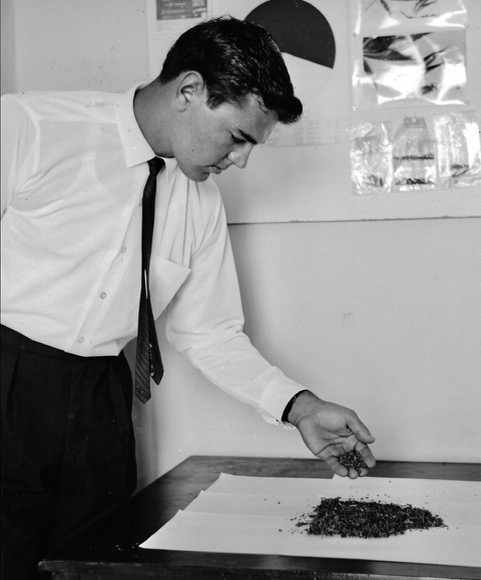 A TRULY NOXIOUS WEED. Cannabis indica produces a flower which produces
A TRULY NOXIOUS WEED. Cannabis indica produces a flower which producesIt isn’t so much the smokers of the reefers the police are after. They are by definition suckers, the “riff-raff of society who, like the poor, are always with us, but the man who makes a profit from the trade.
"It’s the channel and the agents through whom the stuff comes in bulk we’re after," Mr. Robins says. The fact that the stuff has gone up so much in price he takes as a tribute to the annoyance value to the importers of the Special Branch men, who, from Prospect, are, as he says, taking an “interest."
Marijuana is not itself a habit-forming drug, says the Department of Health. Nor is the smoking of a reefer in itself much more effective as a stimulant or depressant of normal inhibitions than two or three martinis.
There is also the problem, says Mr. Robins, that among the inhibitions’ marijuana suppresses not only those which curb orgiastic practices but those which normally curb violence.
The English word assassin, notes the dictionary, is derived from [hashshashin], meaning a smoker of hashish or Indian hemp, or marijuana, dagga. or whatever may be the local name for the flowering tops of Cannabis Indica.
The word assassin sums up the true effect. A few lungsful of the smoke and what was a murderous thought can suddenly become a deed.
All it requires to stop this degenerate habit from growing in Bermuda is for the law abiding and decent Bermudian – and Mr. Robins says this is an extremely law abiding and decent community – to report occurrences and incidents. The smokers would soon be chastened and the profiteers in goal.
He comments: “I am surprised that there are so many unlicensed arms about. Quite a number have come into our possession in the last few months.” They even found one in a taxi which was stopped because the driver was a girl known to be underage. Another was recently “recovered” from a visitor to the Colony.
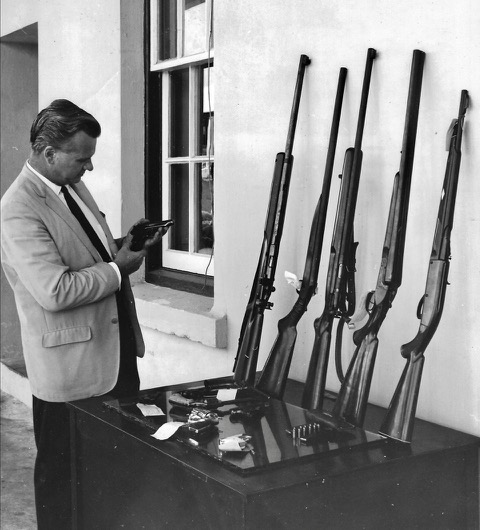 UNLICENSED ARMS. Police say nobody needs arms for their own defence in
UNLICENSED ARMS. Police say nobody needs arms for their own defence in
“Usually the explanation is that the arms were needed for self-protection,” said Mr. Robins, “but we don’t reckon anyone in Bermuda needs a handgun for protection.”
Enlarging on the difficulty in controlling the trafficking in drugs or arms in this small colony, he points out that with the huge ebb and flow of tourists and travelling Bermudians, plus ship’s crews, the Customs
“can't hope to stop (the potential traffic) without minute and thorough search of every package. This would be intolerable and unreasonable particularly in view of Bermuda’s status as a holiday resort.”
Far from the madding crowd as it may be, Bermuda is no sanctuary for a crook. Prospect, Bermuda Police Headquarters, is in constant communication with the FBI; it has liaison with Interpol; Scotland Yard is just as far away as the nearest telephone. It takes a minute to get through and sometimes less. This doesn’t mean that there’s a continual gossiping going on. It does mean, however, that the FBI bulletin arrives at Prospect each week; that queries addressed to Interpol (International Police Organization, Paris) go through the Inspector General of Colonial Police Forces in Whitehall who himself was once Commissioner of Bermuda Police: it does mean that the resources and files of the Yard are handy and available.

As to whether an international crook, someone, for example, on the "ten most wanted men list" of America, could hole up safely in Bermuda, Mr. G. H. Robins thinks his situation would be precarious.
Foreigners, even the nicest of them, are here on sufferance unless as tourists. To work or settle here they have to satisfy the regulations. That means that the Immigration Board has to have them on its files. And the Immigration Board has said that it can and will oust people on the say so of a trustworthy source, such as the police. In the case of a criminal, Mr. Robins said, the procedure would be to pass the word to the Immigration Department who would pass the word to the individual in question that he must terminate his stay. All the police then have to do is to phone their opposite number in the United States and say "Joe So and So is on Flight 59 Idlewild ETA 3.45 EST " and the chaps at the other end are waiting with a bag.
Mr. Robins remarks that this works both ways. The United States doesn't relish having foreign crooks holed up within its boundaries. It also sends them home with a forward warning to the local police. This has happened to Bermudians. With British territories there is such a thing as the Fugitive Offender’s Act which allows, for example, a man wanted in British Guiana to be sent there for trial. It happened recently. The swift international communications network that includes Bermuda is all part of the evolution which Mr. Robins declares has taken place in police forces everywhere during the past generation.
It was in the 1930s that Lord Trenchard, then Commissioner of the Metropolitan Police in London, opened a police college and ushered in the era of professional police. That is, men trained as thoroughly in their particular field, police work, as are engineers or chartered accountants or any of a hundred social, civil or commercial specialists.
All the top men at Prospect are professional today. The chief of Special Branch was a Special Branch man before he came here. The chief of the CID is a CID man of long experience in much more fertile fields of crime than the Bermudian rascal ever dreamt of in his wildest marijuana dreams.

The administrative head has had a lifetime’s experience from the beat up to administration of police. The Commissioner himself was a commissioner before he came here, and so on.
To ensure a continuity of this expertise the practice now is to send a number of Bermuda policemen overseas each year for training at the Police College now in Hampshire. And, says Mr. Robins, this practice will continue.
The parish constable is on his rounds again. Traditional as the village constable of England, the parish constables of Bermuda died out some years ago. The Commissioner of Police, Mr. G. H. Robins, resurrected them in 1961. Before that the force had "district men” which, says Mr. Robins is not quite the same thing. The parish constable should properly live in his own bailiwick, according to tradition but now only five manage to do so. They are married men and have rented houses where they work. The rest commute.
Police parishes do not exactly coincide with geography. Pembroke is divided into three Police parishes; St. George’s is one and St. David's is another; Warwick is divided into two. There are thus 13 in all.
The value of the parish constable is obvious, says Robins. He is the familiar face under the familiar helmet who knows the local people by name and where they live and what they do. Moreover, he's at hand. He's the local Law. It's to him, sitting in front of his TV set, that people (of his parish) phone when they want to complain about a barking dog, or children throwing stones, or a neighbour's unneighbourly behaviour.

The parish constables are responsible to the divisional inspectors of which there are three. One in St. George’s, one in Somerset and one in the City of Hamilton and, besides their living commissions???, they have what Mr. Robins calls “certain tasks” besides certain routines to which they must adhere – a certain night on which they must do night duty, for example.
How has it worked out?
Excellently, says the Commissioner.
Mr. Robins notes that the parish constable is as old as Bermuda’s parliament. He, like the House of Assembly, was instituted in 1620. In those days he was responsible to the local justice of the peace (it was the English system) and he swore an oath of office which he swears today. Curiously it is not a legal oath: it is not required by law.
Tradition, Mr. Robins says is its justification. “It is still taken in England,” he remarks.
“Her Majesty’s peace,” as Mr. Robins points out, is, next to the maintenance of external defence, probably the most important duty of a government. It is the maintenance of law and order (without which [there is] nothing.)
How Bermuda has tackled this duty to itself from its beginnings is first by parish constable, then by Civil Watch, which came into being in 1789 and took the form of “Bow Street runners” familiar to the English history book.
From 1840 onwards the Civil Watch began to be regarded as an organized police force, and by 1895 the chief of police began to be regarded and to be called the Superintendent of Police. He had become a public and authoritative figure.

Bermuda’s charmed life in the face of hurricane’s came to an end on Friday, August 9, at 11.0 am when, after ten years of near misses, Hurricane Arlene struck the Colony head-on and in the space of two hours caused thousands of pounds worth of damage.
Although the Colony’s brush with [hurricane Arlene had] resulted in quite a toll of minor damage there were no personal casualties, the police reported. But keeping the highways clear and correlating damage reports made a heavy demand on the force. There were several extra patrol cars out, and the Commissioner of Police. Mr. G. H. Robins told The Royal Gazette last night there was very widespread interruption of traffic on east and west roads and link roads.
But at one stage headquarters was unable to telephone out. Messages were then relayed to the Electric Light Company from headquarters by radio from a car. “The company was very quick in getting on to live power wires which had fallen across the roads or to large trees which had fallen,” commented the Commissioner.
Damage reported to the police, apart from private houses, occurred largely to boats. The Mid-Ocean Club lost nearly the whole of their fleet, and boats in Harrington Sound were badly affected. Boats sank at their moorings and many broke loose completely.
Breaking down the damage reports, there were a large number of fallen roofs reported, and a number of cases of tiles being blown off.
The Associated Press dispatches read as follows:
HAMILTON. Bermuda, Aug. 9. (AP). — Hurricane Arlene whirled over Bermuda at 92 miles an hour Friday, but no one was injured and damage was negligible. Some banana and pine trees were blown down and the causeway leading to the U.S. Air Force base at Kindley Field was blocked. The eye of the hurricane — a section of dead calm — crossed Bermuda exactly at noon local time.
The UPI story read:
HAMILTON. Bermuda. – Wind gusts of up to 98 miles per hour were reported as Hurricane Arlene swept over Bermuda during the lunch hour. But little damage was reported from the storm. At 6 p.m. (E.D.T.) weather planes located the hurricane some 190 miles northeast of the island, moving northeastward at 25 miles per hour. Its winds were recorded at about 90 miles per hour near the centre. Weather experts predicted Bermuda might have normal weather again by nightfall due to the rapid movement of Arlene.
The “post mortem” held by officialdom on Hurricane Arlene is understood to have resulted in the appointment of a three-man committee comprising the Colonial Secretary, the Hon. J. W. Sykes, the Commissioner of Police, Mr. G. H. Robins, and Mr. J. J. Outerbridge of the Disaster Relief organization, who will hold meetings from time to time to which Kindley has been invited to attend.
The meeting is said to have been attended by about 14 people, including Colonel Jones, commander of Kindley Air Force Base.
Wheels [were] set in motion for a coordinated hurricane communication headquarters [during a meeting] at the Colonial Secretariat. The so-called “post mortem” meeting on hurricane Arlene proved to be extremely useful to all who attended, according to the Government Public Information Officer. Representatives of the Bermuda Police Force were present.
 HURRICANE SERVICE CO-ORDINATION
HURRICANE SERVICE CO-ORDINATION
Editor’s note - This was no doubt the forerunner of what we know today as the Emergency Measures Organization (EMO)
It was the consensus that Bermudians had perhaps become a little complacent as they had been extremely fortunate in having hurricanes miss the Colony for the last few years. While records show that many hurricanes headed in the direction of Bermuda do veer off and miss the island, it was always a sensible precaution to expect the worst and then count one’s blessings if the storm passed Bermuda by.
A general discussion followed on existing communications between Government departments, utilities, the Police, the Fire Department and the local radio stations during times of emergency. A more widely understood local system of warnings was also discussed as were priorities of relief and service restoration.
A three-man committee was appointed by the Colonial Secretary to formulate an operational plan following the lines of suggestions put forward at the meeting. Chairman of the committee is Mr. G. H. Robins, Commissioner of Police, with members, the Fire Commissioner, Mr. Martin Grimes and Mr. J. J. Outerbridge, Director of the Disaster Relief Organization. A representative from Kindley Air Force Base was invited to sit with the committee as an observer.
To this central point will flock representatives of public utilities, Government departments, the Radio Society, the Disaster Relief Organisation and the Hamilton Fire Brigade. Even if an obliging hurricane does not give the Committee the chance to try out its plan, a practice exercise is scheduled “in the near future” to acquaint key personnel with their duties and to test the communications hook-up.
The seventieth annual conference of the International Association of Chiefs of Police will be attended by Bermuda’s Police Commissioner, Mr. G. H. Robins. The conference is being held at Houston, Texas from Saturday, October 5, until October 10.
It will give Mr. Robins his first opportunity of visiting the United States and he and his wife will be leaving Bermuda on Friday. They will fly to Texas via New York, but the Commissioner will see no more of this great metropolis than Idlewild Airport as he changes planes.
Two of the Robins’s closest friends will be attending the convention. Colonel Eric St. Johnston, Chief Constable of Lancashire, who was best man at their wedding and attended the same school as Mr. Robins will be there. So will Mr. John Hodge, Inspector General of Police in Nigeria. He and Bermuda’s Commissioner worked together from 1958 to 1960 when Mr. Robins came to the Colony.
“There may be other police chiefs who I know going to Texas, but I will not find that out until I get there,” he told a RG reporter.
Mr. and Mrs. Robins plan to fly to Mexico for their first holiday there until October 11. After spending a few days in Mexico City, they will continue probably by road to Mazatlan on the Pacific coast which is north of Acapulco and northwest of Mexico City. “We hear it’s not so chromium-plated as Acapulco,” Mr. Robins said with a laugh, “and I hope to do some fishing there.” He thought they would stay in Mazatlan for about 10 days and then return to Mexico City for a little while longer before catching the direct flight to Bermuda on October 25.
Chief Superintendent Frank Williams will be acting Commissioner of Police during Mr. Robins’s absence.
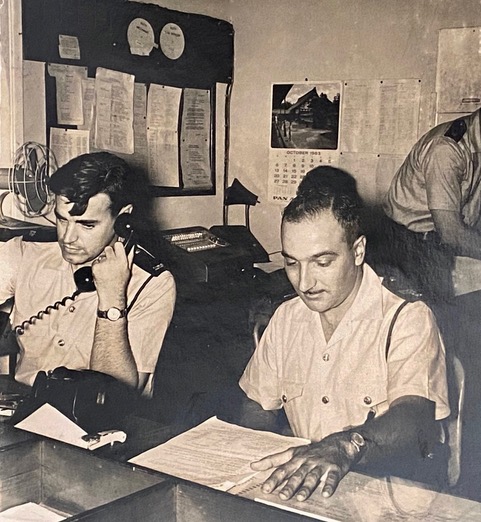
As a matter of interest, three news items appeared as follows in the Diary columns of the RG reporting on police personnel activities:
- Chief Superintendent H. M. Saunders returned last week-end from a six-week holiday in the United Kingdom with his wife and 14-year-old twins, a son and daughter. They managed to see a bit of sunshine and travelled in a rented car for over 4,000 miles in England, Scotland and Wales. The Chief Superintendent has returned to a “new” job. He is now head of police operations instead of being in charge of administration and finance. He has swapped positions with Chief Superintendent Frank Williams who, until October 25, will also be acting Commissioner. Mr. G. H. Robins left yesterday to attend a police chiefs conference in Houston, Texas.
- Publicity was given in a recent edition of London’s Daily Express to Miss Jenny Robins, the attractive 24-year-old daughter of Bermuda’s Commissioner of Police, Mr. G. H. Robins and his wife, Lou. It is stated she prefers living in St. Tropez to Bermuda, although she enjoys holidays here. Miss Robins is in the real estate business in St. Tropez.
- The mess kitchen of the Bermuda Police Force is now being renovated and should be re-opening within a week’s time. In consequence, the mess has been closed since the middle of September and those who use it — notably police bachelors — are now eating their meals in Hamilton’s restaurants.
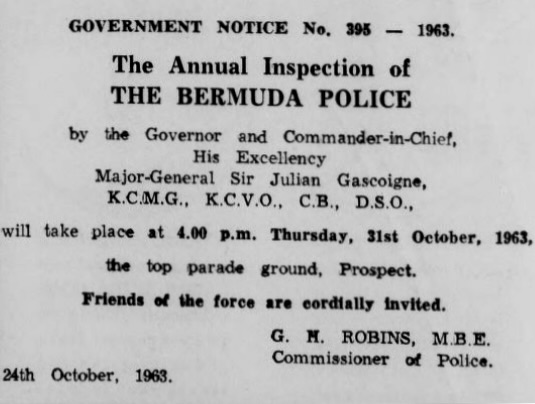
Bermuda was represented at the annual conference of the International Association of Chiefs of Police for the first time this year.
Mr. G. H. Robins, Commissioner of Police, has just returned from Houston, Texas, where he attended the 70th annual conference held for six days at the beginning of the month. The Commissioner, accompanied by his wife, then went to Mexico for a two-week holiday and returned to the Colony last Friday night.
Mr. Robins thought Mexico was a country of great potential, provided a stable government was in power.
Mr. Robins was impressed with the enormous exhibition staged in the hall attached to the Shamrock Hilton Hotel in Houston. This featured police equipment and ranged from handcuffs to radar meters and cars. He was particularly interested in “breathalysers” sic for testing the quantity of alcohol on a suspect’s breath. “I have brought all the details back with me,” he told the RG reporter.
One of the discussions at the convention concerned arrest, search and seizure, while he also was interested in juvenile delinquency and youth crime. He thought that representatives of larger territories were intrigued with the discussion on liaison between police and industrial security officers, and he was fascinated as a listener with talks on civil rights, “which is a prominent thing in the United States at present.”
Among those Commissioner Robins knew personally were Inspector General John Hodge of Nigeria; Mr. M. K. T. Melville Roberts, Commissioner of Federal territory in Nigeria who was a superintendent under Mr. Robins when the latter was in Nigeria; Mr. William Leigh, Commissioner of Siera Leone; and Commissioner Ronald Stout of Barbados who attended a course at the Police College in England with Mr. Robins 13 years ago.
On his first visit to the United States, he remarked: “I thought Texas was a fabulous state, from the little I saw of it.” He and his wife visited the San Jacinto National Park outside Houston, which is a memorial to the defeat of the Mexicans by General Sam Houston in 1836, after which Texas obtained its independence from Mexico and later joined the Union.
Before going to Mexico the Robins’ saw a rodeo some distance from Houston and thought it “very colourful.’’ It was held at night and floodlights provided illumination.
Renting a car they went to see Toluca Marca, the well-known Pyramids, Taxco (Taxco de Alarcón), Cuernavaca, Puebla, and Acapulco, where they spent a week. Mrs. Robins thought Mexico was a country of great potential, provided a stable government was in power.
[Mr. Robins divulged that he was given a briefcase at the conference containing a comb, a pair of chopsticks, a writing pad and a Texas tie. He never did find out why the chopsticks were included.]
His Imperial Majesty, Emperor Haile Selassie, paid a brief visit to Bermuda in October 1963 when he was enroute to the U.S. for a State Visit during which time he would be addressing the General Assembly of the United Nations, and would also meet with President John F. Kennedy.
During his brief stopover in Bermuda the Civil Air Terminal was packed with hundreds of people gathered to witness this historic event. His Imperial Majesty met with local dignitaries. The photos below were taken by a police photographer.
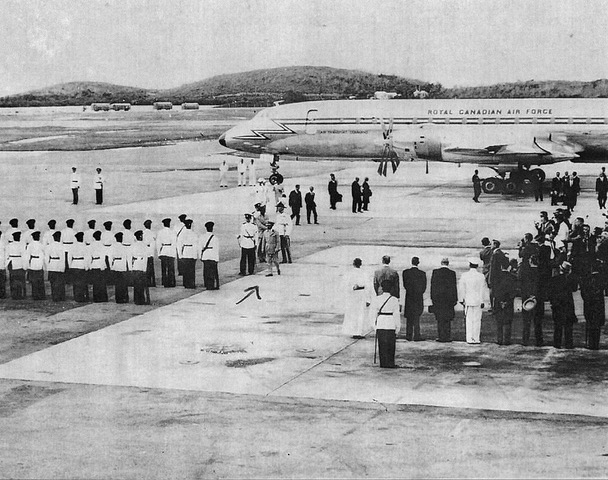
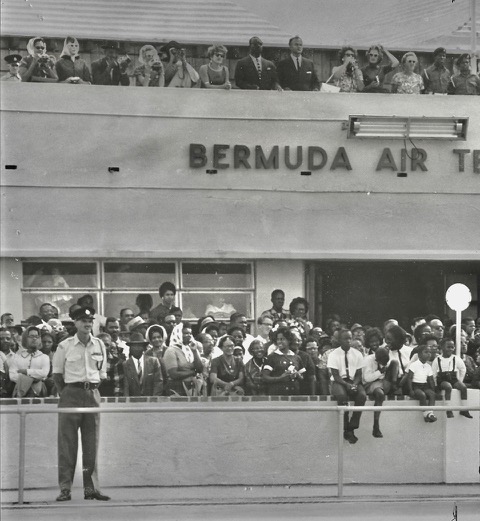
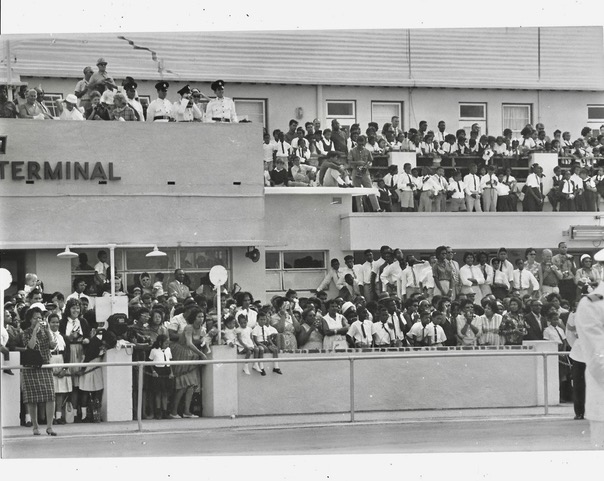
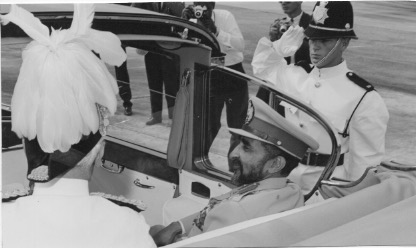
A charge of attempting to take fish by spear within one mile of a beach on September 15 brought a not guilty plea in magistrates court from the defendant, Leon Kegel of Devonshire — and a legal argument from his counsel, Mr. John M. Patton, M.C.P.
Mr. Patton submitted that the regulation governing taking fish (or attempting to) by spear, which was made in March of this year, was completely new and that it had been intended to stop spear fishing on the boilers of the South Shore, as there had been abuse there.
Counsel’s position was that there are no beaches as such on the North Shore except at Shelly Bay and Admiralty House, “and Deep Bay,” added the Wor. L.J. Williams. A patch of sand was not a beach, said Mr. Patton, and if it had been intended to stop spear fishing everywhere off Bermuda’s coastline, the regulation would have used the word “shore.”
Three witnesses testified to the incident which brought Kegel to court. They were Mrs. Lou Robins of Devonshire, Sgt. James Moir, and W.p.c. Marjory Wainwright. Mr. Williams decided to visit the place [Robinson's Bay in Devonshire] before the end of the week and said he would resume the hearing after this. Sgt. Robert Coppock prosecuted.
Mrs. Robins, wife of the Commissioner of Police testified:
"At 3.30 p.m. on Sunday, September 15, I was at Robinson’s Bay on the North Shore, Devonshire. It is down below a private club beach with diving boards. I was snorkeling and had on my mask over my face. My face was submerged and I was observing fish under the water. I had observed a man snorkeling not in an ordinary way. I went after him and to my astonishment he brought up on the end of his spear a most beautiful angel fish. I was within a foot of him.” Mrs. Robins said that at first she thought he might have been collecting shells and his actions aroused her curiosity.
"All three prongs of the spear had been in the middle of the wriggling fish.” added the witness, who said that she did not see the fish out of the water at any time. Mr. Patton in cross-examination, tried to establish that the place was not really a beach. Mrs. Robins said that the members of the club used it as a beach and the children played there.
The witness said she had heard Mrs. Robins tell the defendant that it was illegal to spear fish so near the shore and that it was a private club beach. He had been holding a spear.
Sgt. James Moir said that on September 16 he had seen the defendant at the Waterfront Restaurant and had told him he was there under the instructions of the Commissioner of Police. The police were inquiring into the allegation that he had taken fish by spear at Robinson's Bay in Devonshire.
In a statement made to the officer and read in court, the defendant said: “I did not know the law, and since Mrs. Robins knew what I was doing was wrong, she should have stopped me instead of following me.”
There followed an interchange between counsel and magistrate concerning the phraseology and meaning of the regulation and of the word beach. Counsel claimed that if the regulations had meant to prohibit spear fishing entirely they would not have included a regulation that one may spear not more than two fish or three lobsters.
Mr. Patton made an effort to define beach by referring to the Oxford Dictionary, but after running into, “water-worn pebbles” he decided that “probably they don’t have any sand in England!”
[For the decision on this case see December 18, 1963]
If Warwick residents want a permanent police substation they will have to get in touch with their M.C.P.s’. This was the situation last night following a visit by the parish’s four M.C.P.s to the temporary sub-station at the invitation of the Commissioner of Police, Mr. G. H. Robins.
Mr. Barnes did have his own comment on the situation. “I think the matter is worth considering,” he stated. “The population of the western parishes has been increasing over the years and at one time I thought a sub-station in the parish was desirable, but the powers that be turned the proposal down.”
“Generally speaking the people are more interested in having more police patrols. Whether these patrols actually originate from a police station in the parish or elsewhere I don’t think was of very great concern to the people to whom I spoke. But they all had strong views that the parish is in need of increased police patrols.”
Mr. Jack Sharpe, M.C.P, approached for his comments following his visit to the temporary sub-station summed up his impressions by saying. “I think the people in Warwick can feel reassured that the police are doing everything possible to apprehend the person responsible, and to prevent further recurrences.” He said that they did not really discuss the question as to whether the station there should be permanent, although he noted the police view was apparently one that favoured a station there.
"But I could see the police point of view in having their western branch more centrally located than in Somerset,” he added.
‘‘I know there have been a couple of moves made to get a police station in this district but whether or not it would prevent such crimes is questionable. In fact I don’t think it would, although it would obviously facilitate police work,” he stated.
Mr. Patton was satisfied! from the morning’s observations that the police were doing everything within reason in the present case. Mr. Barnes was also very satisfied with the efforts being made to solve this crime. He too intends to wait for constituents to come to him with ideas but did think personally that the matter of a permanent station was worth consideration.
Mr. Richards (sic) commented on the present case that it seemed to him the police were making an all-out effort to apprehend the criminal.
Teams of policemen based in their temporary headquarters in Warwick went from house to house in a relentless search for a rapist, while in other parishes the island wide investigations continued. It was a relentless routine, but so far no new developments were reported.
The police did, however, make a further appeal to the public for information from any persons who were in the area of the Middle Road, Warwick between 1.45 a.m. and 2.45 a.m. on Sunday morning. The appeal is addressed particularly to taxi drivers who may have seen a man walking in the area.
Anyone with information should call any police station or dial 2-2222. A number of people have responded to appeals already, but the police feel there may be others who have not bothered to call in, or have thought that what they knew was unimportant.
Another appeal is being made to residents of Warwick who may have been bothered with prowlers and have not reported the incidents to the police. This information, they say, would be particularly helpful if they can give any description of such a prowler. Police also suggest that if they suspect a person may be a prowler, they will welcome any such information and will treat the information, as well as any other, in the strictest confidence.
A police spokesman made an official reply to [an] allegation reported on Thursday that police questioning methods in the Cedar Hill rape case, had been objectionable to some residents. The spokesman pointed out that the questioning is done from a questionnaire approved by a senior police officer, and all the questions are considered necessary to the investigation of the case. He emphasized that no questions are of an intimate or personal nature, as alleged by some residents. “The questions are designed to establish where the male occupants of the house were at that particular night or morning, he said, adding, “It is not just a case of a police officer knocking on a door and asking the first few questions that come to his head.”
Police hope that this may attract more Bermudians to consider the force as a career, and help raise the local recruiting figures, which have remained at a low level, despite efforts to combat the situation.
Commented a police spokeswoman yesterday: “Local recruitment has not been going so well this past year and we are trying to get these local fellows to take an interest in coming into the police. We know the salary is not too high, but after all salary is not everything, and there is the pride of being in the Force and doing police work, which should more than offset the actual salaries.”
The film will last for 12 minutes, and before it starts some of the star performers will be interviewed.

A complete table-tennis set was presented to the Salvation Army at the Cedar Hill, Warwick branch last night, by Police Commissioner J. H. Robins, “for the extraordinarily good co-operation” shown to the police when they used the Warwick headquarters as a temporary police station some weeks ago.
“We had to get to the bottom of a rather nasty crime,” he told the assembled children, Salvation Army officers and policemen, “because if you don’t catch a criminal, inevitably he will commit the crime again.” The Commissioner was referring to an assault on a Warwick woman after which the police set up an investigation headquarters in the Salvation Army home, to be nearer the scene of the crime.
“In return for your help and inconvenience caused you . . . we are happy to present you with this table tennis set,” he concluded, formally handing over a bat and ball to Captain Benjamin of the Salvation Army.
 CEDAR HILL – Police Commissioner Robins demonstrates a table tennis stroke for one of the youngsters
CEDAR HILL – Police Commissioner Robins demonstrates a table tennis stroke for one of the youngsters After Mr. Robins presented the table Superintendent Richard Fielders, in charge of the C.I.D., added his thanks and, said: “Our job is a difficult and sometimes an unpleasant one and we are grateful for the co-operation we received from you all.”
The rapid build-up of the Bermuda Police Boat Club’s snipe fleet in only three years was praised at the club’s annual prize-giving dinner at the Sherwood Manor Hotel over the week-end.
In replying to the toast to visiting guests, Spanish Point Boat Club representative Ronnie Marshall pointed out that from a start with two snipes three years ago, the Police club had increased their fleet to seven this past season. Now, he understood, two more had been added. The total of nine, Mr. Marshall observed, would match the size of the fleet at Spanish Point. This was particularly commendable because the club had only about 30 active sailing members. Spanish Point also had nine snipes but they have 600 members.
Mr. Robins who attended with Mrs. Robins gave the toast to the Queen. Club commodore Des McSherry gave the toast to the United States while vice-commodore Clive Thompson welcomed the visiting guests who included St. George’s Dinghy and Sports Club commodore Fred Roberts.
Highlight of the prize presentations was the awarding of a special trophy in memory of Andy Wilson, the likeable policeman and club member who was killed in a road accident earlier this year. It is a hand- crafted model of a snipe in cedar on a cedar base and was both made and presented by Brownlow Gray. To be known as the Andy Wilson prize it will go to the most successful Police Boat Club sailor over the course of the entire season. The first winner is Clive Thompson who received It from Mr. Gray.
Soares Trophy — Jeff Payne;
Leseur Trophy — Clive Thompson;
Try Again Trophy — Ian Davis;
Profiteers Cup — Dave Garland;
Admiralty Trophy — John Barnett;
Clarence Cove Trophy — Dave Garland;
Colonial Trophy — John Barnett;
Wooden Spoon — Alex McIntosh;
Life Ring (for most capsizing’s) — Jeff Payne;
B.P.B.C. Trophy — Jeff Payne;
Longtail Trophy — Alex McIntosh;
Sundowner Cup — George Hammond.
At the conclusion of the awards, Mr. Robins observed that of all the prize-giving dinners he had attended, this was one of the best ever.

The South Shore of Bermuda is not the only shore which has beaches, the Wor. L. J. Williams decided yesterday in Hamilton magistrates court finding that Robinson’s Bay on the North Shore was also a beach.
The decision was an important one because Leon Kegel of Cavendish Heights was charged before the magistrate with using a spear to take a fish (or attempt to take) within a mile of a beach. Mr. John M. Patton, M.C.P., counsel for Kegel, submitted in a previous hearing that Robinson’s Bay was not a beach under the government regulations. The case was adjourned so that the magistrate could view the scene of the alleged spear-fishing.
Yesterday Mr. Williams said he had no hesitation in finding that Robinson's Bay was “very much” a beach. “It has pebbles, sand, and an area stretching on a curved surface about 30 yards to a depth of 30 feet,” said Mr. Williams. “That's what I saw when I was there.” Kegel, who denied taking fish by spear, was found not guilty of taking a fish out of its natural habitat (the water). None of the witnesses at the prior hearing [on November 13 this year] could say that they actually saw the fish out of water that he was said to have speared. However, the magistrate found him guilty of attempting to take the fish, and fined him £2.
Yesterday, Kegel said in evidence that he and his wife had been on Robinson’s Beach. They had a perfect right to be on the beach as they were members, he asserted. He said he went into the water to dig up coral. Angel fish are friendly, said he, and pushed against things like sticks.
Mr. Williams observed that because Kegel had no fish on the shore, that did not mean that it had not been left in the water. Sgt. Coppock then called the magistrate’s attention to the testimony of Sgt. James Moir at the earlier hearing, in which the officer stated that Kegel had admitted spearing a fish but said that it had got away.
In response to the defendant's mention that he had not been familiar with Bermuda laws, the magistrate told him that if a man were versed in the laws of a country there wouldn’t be any need for lawyers
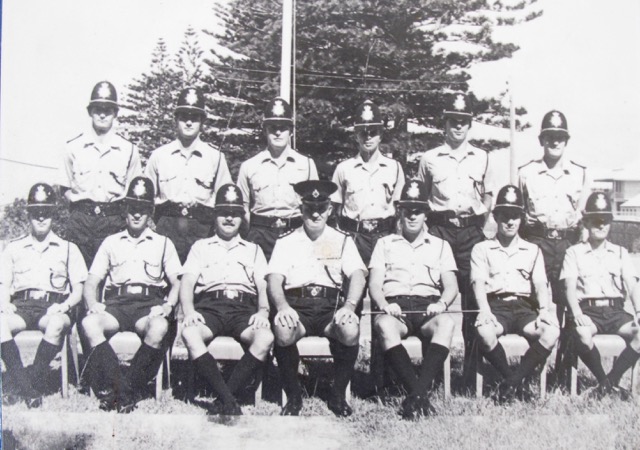 Top Row (l-r) Alan Kennedy, Leonard Mustard, Robert Holdbrook,
Top Row (l-r) Alan Kennedy, Leonard Mustard, Robert Holdbrook, Ten expatriate police recruits passed out of the Training School yesterday and became fully-fledged constables on the Bermuda force.
The recruits had just successfully completed a 12-week basic training course. Watching the passing out was the Commissioner of Police, Mr. G. Robins, and other senior police officials.
A salute at the march past of the recruits was taken by Mr. Robins who later presented batons of honour to the best pupils of the training classes and ten Royal Life Saving Society Certificates, medallions and bronze medallions, to members of the police force.

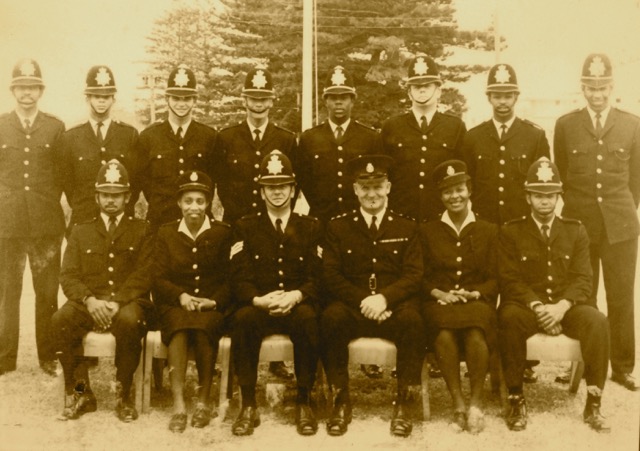 Top Row (l-r) Neville Darrell, Gilmore "Gil" Simons, Thomas Barton, Gary Perinchief (Takbir Sharrieff),
Top Row (l-r) Neville Darrell, Gilmore "Gil" Simons, Thomas Barton, Gary Perinchief (Takbir Sharrieff),
P.C. T.H Barton received the Baton of Honour for being the top recruit of Training Course #3 held earlier in the year, and P.C. A. Forbes received the same award for being the top recruit in the class that was passing out.
Lifesaving awards went to constables, M. W. Gibbons, M. Packwood, B. L. M. Rawlins, C. M. Hind, F. G. Perinchief, F. C. Aubrey, C. J. Floodgate, P. M. Trott. G. Simons and Cadet H. Edwards.
OF NOTE: Pc Thomas Barton is the son of Mrs. Bessie Barton who is the daughter of a policeman who came to Bermuda in 1928.
Police Magazines
In 1955, the Bermuda Police started publishing regular editions of the Bermuda Police Magazines, and these provide a treasure trove of information about police-related activities ranging from new arrivals and departures, transfers and promotions, obituary’s, Divisional notes, social activities such as weddings, official functions, and especially, police involvement in sports. Until recently, it was literally impossible to access copies of these police magazines, but we are now delighted to make them available here on our ExPo website.
Police involvement in team sports such as football, rugby and cricket, would have been impossible without the support of the police hierarchy because it was necessary to have team members play regularly, if at all possible, and that meant being able to have time off for those who would normally be working. As head of the Police Force, Commissioner Robins was instrumental in ensuring that whenever feasible police officers would be allowed time off for sports when representing the Police.
Two police magazines were published during 1963 - these were the Spring and Winter editions, and the following articles and photos are examples of sports activities reported on in these magazines.
THE BERMUDA POLICE MAGAZINE – SPRING, 1963 page 68
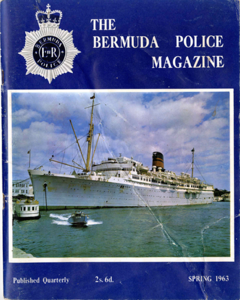
CLICK HERE to view Spring edition 1963

THE BERMUDA POLICE MAGAZINE – SPRING, 1963 page 67

THE BERMUDA POLICE MAGAZINE – SPRING, 1963 page 65
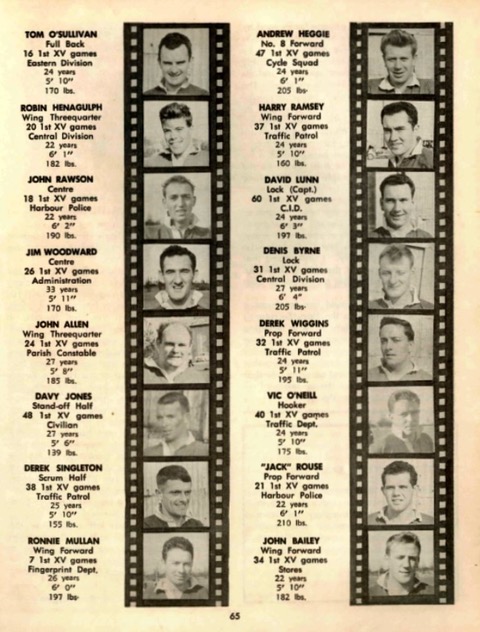
THE BERMUDA POLICE MAGAZINE – SPRING, 1963 page 58
The cost of publishing the police magazines was partially met by including advertisements such as this one below for Triumph motor cycles sold in Bermuda by C.E. Young and Sons which was an ideal advertisement in a police magazine as these Triumph motor cycles were ridden by the Police Motor Cycle Display thoughout their history.

THE BERMUDA POLICE MAGAZINE - WINTER, 1963
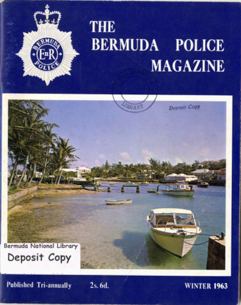
CLICK HERE to view Winter edition 1963





